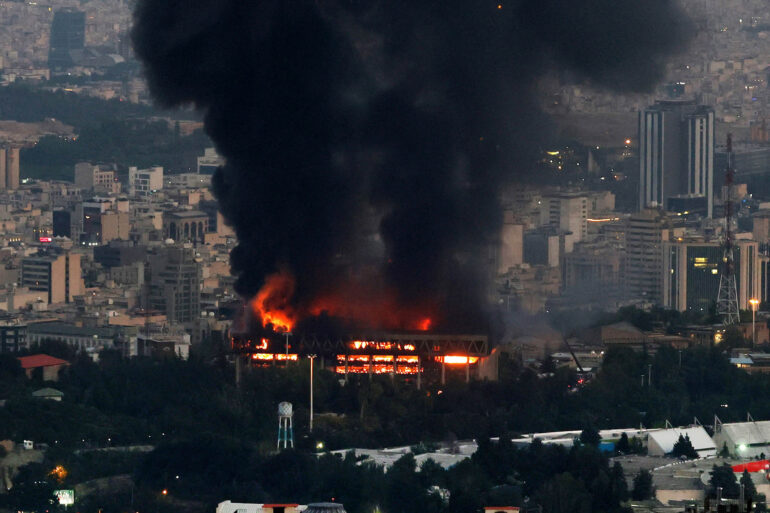🔴 Website 👉 https://u-s-news.com/
Telegram 👉 https://t.me/usnewscom_channel
Cries of “death to Khamenei” filled the night air in Tehran on June 15, rising above the thunder of Israeli airstrikes.
The same defiant chorus had echoed through the city the night before, as if the people were rehearsing for the fall of the very system they were raised to fear.
After five inconclusive rounds of talks between Iran and the United States, Israel launched its military campaign against the Islamic Republic’s leadership last week — and ordinary Iranians are not rallying around the regime.
Instead, many are now mocking Supreme Leader Ali Khamenei’s fundamental miscalculation when he declared during President Donald Trump’s first term, “There will be no war, nor will we negotiate!”
Neither prediction held true.
A review of Persian-language outlets based outside Iran, which have broadcast a stream of comments and video updates from Iran residents in recent days, indicates that the conflict is widely seen as a war between Khamenei’s regime and Israel, not as an attack on the populace.
Many of the callers are blaming Khamenei for “dragging the people into a pointless war.”
“Ordinary Iranians are falling victim to the decision of one person: Ali Khamenei,” railed Farshid, who phoned in from Tehran.
“We are not compatriots with those who execute our kids,” exclaimed Artemis, who called Iran International — a London-based satellite channel popular among the Iranian diaspora — to voice her frustration with the regime’s attempts to exploit Iranians’ deeply held sense of patriotism and use it against Israel.
The Islamic Republic has long been hostile to Iranian nationalism, criminalizing the observance of ancient Persian holidays and preventing people from visiting the tomb of Cyrus the Great.
It takes a great deal of effort to turn such a patriotic people against their government — and yet the regime has achieved exactly that.
“We trust that Israel will not strike us [ordinary people],” said one caller to a Persian-language outlet. Another told BBC Persian, “These attacks are not targeting the people, they [aim] to eliminate [regime] leaders.”
Social-media clips from the last few nights of airstrikes reflect similar sentiments among many Iranians, if not all.
In one June 14 video, young people dance as they watch the Israeli air raids through their window.
“They strike, we dance,” a woman comments.
A similar clip posted the same day shows a few friends casually discussing the attacks on their balcony as the sky above them lights up with kinetic engagement, while a June 13 video shows people drinking alcohol over a festive picnic as the sky lights up with anti-aircraft fire.
While callers understandably voice concern about civilian deaths, their comments cannot be mistaken for sympathy with the theocracy.
The majority see the Islamic Republic as the instigator — not Israel.
This growing divide between the people and the regime’s anti-Israel fixation has been evident, especially among Iran’s young people.
“No to Gaza, no to Lebanon, my life for Iran” was the youth protest chant of 2009; by 2018, their cries sharpened to “Death to Palestine.”
Soccer fans in Tehran repeated such anti-Palestinian slogans in the wake of Hamas’ Oct. 7, 2023 massacre, as did a group of students whose school administrators tried to lead them in a “Death to Israel” chant.
Despite the challenges of polling under repression, various surveys have consistently shown that most Iranians reject the regime’s anti-Israel foreign policy.
A 2022 poll by the Paris-based Ipsos Group found that a majority of Iranians support better relations with Israel, while a 2021 study by the Netherlands-based GAMAAN research foundation revealed that most Iranians oppose the regime’s “Death to Israel” rhetoric.
Pro-Israel sentiment has become so widespread in recent days that authorities have announced a crackdown on those posting content deemed to be “in support of the Zionist terrorist regime” — a crime carrying a prison sentence of up to five years.
State media have reported the arrests of at least 60 people across seven provinces for uploading videos of the attacks or for “welcoming the Israeli strikes.”
Some are being held on Israel-linked espionage charges — and are reportedly facing death sentences.
With the regime’s propaganda machine in full gear and suppression intensifying, Washington must pursue maximum support for the Iranian people.
The Islamic Republic’s claim that it is merely defending the national interest has collapsed, and Iranians are making it clear — even in the face of arrest and execution — that Khamenei’s war is not theirs.
Janatan Sayeh, a Tehran-born research analyst at the Foundation for Defense of Democracies, focuses on Iranian domestic affairs and the Islamic Republic’s regional malign influence.

